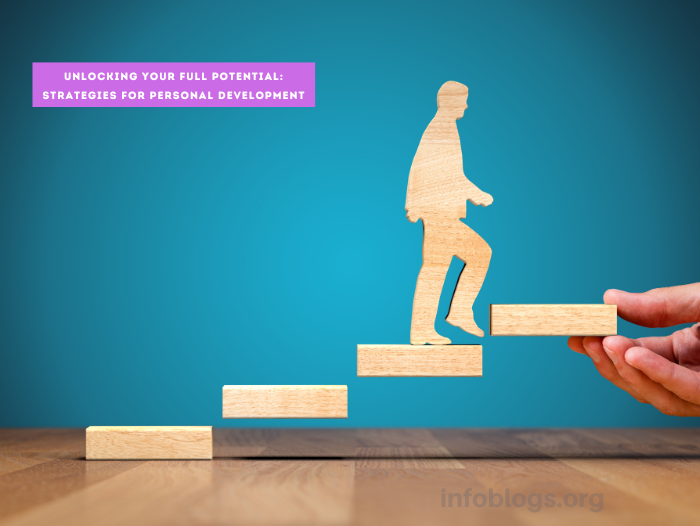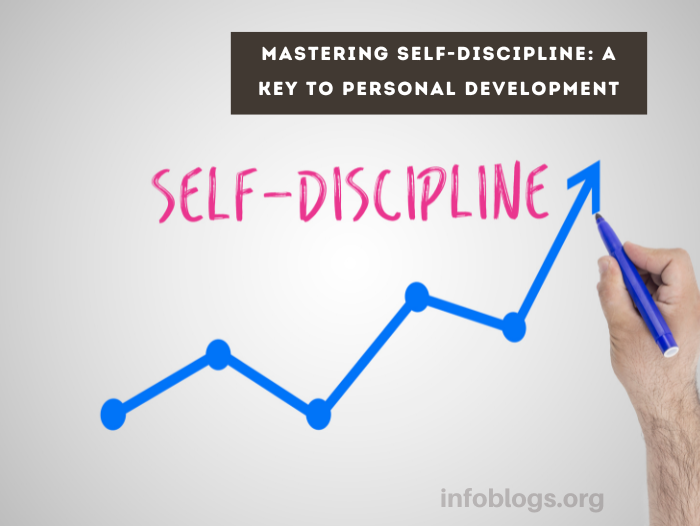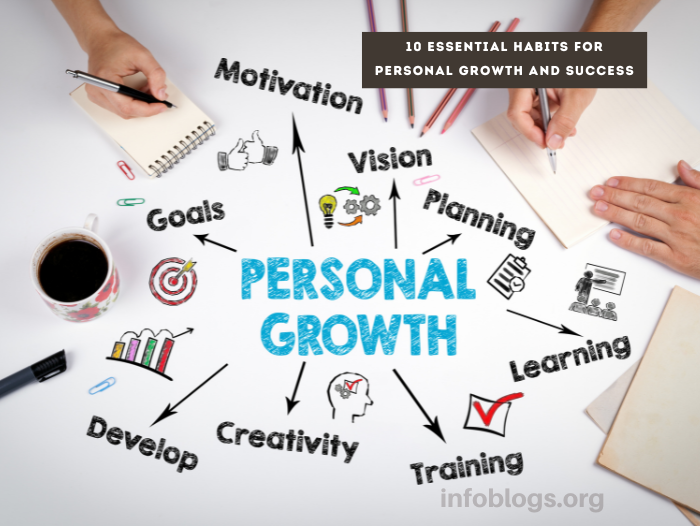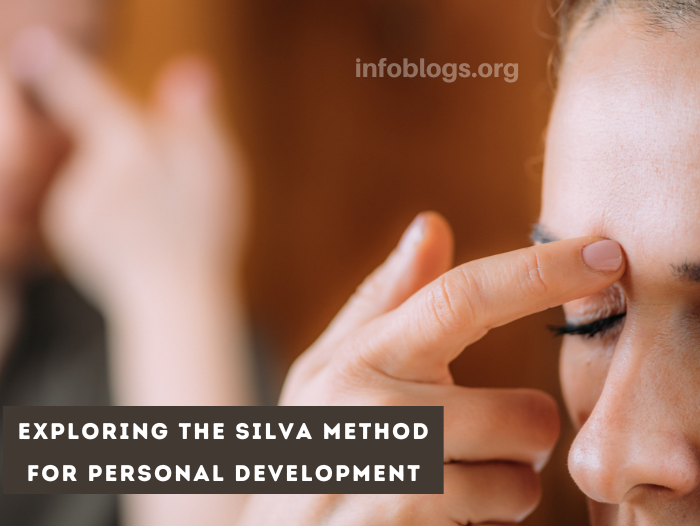
May 29, 2023 | Personal Development
Unlocking our untapped potential is within each of us, and personal development is the means to unleash it. It allows us to grow, accomplish our objectives, and live satisfying lives. Effective strategies are essential to begin a journey of self-discovery and self-improvement. This article will examine strategies for personal development that can help you unlock your full potential and set you on the path to success.
Self-Reflection:
To begin personal development, it is important to engage in self-reflection. This involves taking the time to assess your strengths, weaknesses, values, and passions. By reflecting on past experiences, you can identify patterns and areas for improvement. Through self-reflection, you can gain valuable insights into your identity and goals, creating a foundation for personal growth.
Set Clear Goals:
The act of setting goals is a potent technique for enhancing oneself. Be specific and precise when outlining your objectives, both immediate and distant, and ensure they are significant and in harmony with your principles. Divide bigger aspirations into manageable, doable tasks. Establishing unambiguous goals provides guidance and inspiration, driving you towards growth and progress.
Continuous Learning:
Make a commitment to personal development by adopting lifelong learning as a crucial strategy. Participate in activities that enhance your knowledge and skills, such as reading, attending workshops, or enrolling in online courses. Look for mentors or professionals in your area of interest. Embrace the attitude of a lifelong learner, and continue to gain new knowledge and understanding without ever stopping.
Embrace Change:
Personal growth involves change that cannot be avoided. Instead of opposing it, take it as a chance to develop. Venture beyond your comfort zone and experiment with novel situations. Remain receptive to diverse viewpoints and concepts. By welcoming change, you can uncover untapped potential, cultivate resilience, and discover new capabilities.
Practice Self-Compassion:
To foster personal growth, it is crucial to have self-compassion. This involves being kind, understanding, and forgiving towards oneself. Engage in self-care routines that cater to your physical, mental, and emotional health. Recognize your achievements and accept that obstacles are a natural part of the process. Nurturing self-compassion provides a positive inner atmosphere for self-improvement.
Cultivate a Growth Mindset:
To fully realize your potential, it's crucial to cultivate a growth mindset. This means having faith in your ability to improve through hard work and determination. Instead of seeing challenges as roadblocks, view them as chances for personal development. Mistakes should be seen as opportunities to learn and grow, not as failures. By adopting a growth mindset, you can overcome any self-imposed limitations and discover your true potential.
Develop Healthy Habits:
Our lives are influenced by the habits we form and they play a vital role in our personal growth. Foster positive habits that aid in your progress and health. These could be exercising regularly, being mindful, eating a balanced diet, or setting a consistent sleep pattern. The accumulation of small, constructive habits can have a significant impact in unleashing your complete potential.
Seek Support and Feedback:
Build a strong support system of mentors, friends, or colleagues who motivate and push you to grow. Consult reliable individuals for feedback that can provide valuable perspectives on your strengths and areas needing improvement. Constructive criticism enables you to hone your abilities, address weaknesses, and expedite your personal growth process.
Take Action:
To unleash your complete potential, you must act. Overcome your reluctance by venturing beyond your familiar territory and welcoming novel prospects. Devise a strategy and progress steadily towards your objectives. Refrain from allowing apprehension or lack of confidence to impede you. Adopt a mentality of determination and persistence, and observe as your potential blossoms.
Reflect and Adjust:
Consistently evaluate your advancement and modify your tactics accordingly. Analyze what is effective and what requires enhancement. Commemorate achievements throughout the process and recognize your development. Revise your objectives and schemes as you acquire fresh perspectives and encounters. Consistent contemplation and adaptation guarantee that you remain focused and continue to unleash your complete potential.
Conclusion:
The journey of personal development towards unlocking your full potential lasts a lifetime. To unleash your true capabilities and lead a satisfying life, you can adopt various tactics, including self-reflection, goal-setting, continuous learning, embracing change, practicing self-kindness, cultivating a growth mindset, developing healthy habits, seeking support, taking action, and reflecting and adjusting. It's important to keep in mind that personal development is an individual and personal expedition that demands curiosity, dedication, and perseverance.

May 29, 2023 | Personal Development
The power of positive thinking is crucial in shaping our experiences and determining our success level. It has the ability to transform our mindset and create new opportunities for us. Developing a positive outlook can help us overcome challenges, become more resilient, and attain our objectives. This article will delve into the significant influence of positive thinking on both personal and professional accomplishments and offer tips to help you harness its transformative potential.
Understanding the Power of Positive Thinking:
Having a positive mindset goes beyond being optimistic. It means intentionally directing your attention towards the positive aspects of a circumstance, having faith in your capabilities, and keeping a positive perspective. When you adopt a positive attitude, you view obstacles as chances for growth, conquer self-distrust, and draw in favorable results.
Shifting Perspectives:
To harness the power of positive thinking, one must alter their outlook. Practice transforming pessimistic thoughts into optimistic ones and uncover the benefits in difficult circumstances. Rather than fixating on potential failures, concentrate on the lessons or advantages that can be gained. This approach fosters resilience by regarding obstacles as temporary and surmountable, resulting in a mindset of empowerment.
Practicing Gratitude:
The power of positive thinking can be harnessed through gratitude. Daily reflection on the things, big or small, that you are thankful for can shift your focus towards the abundance in your life and cultivate contentment and appreciation. Acknowledging the positives invites more positivity into your life.
Building Self-Belief:
To achieve success, it is crucial to have faith in oneself. You can enhance your self-assurance by acknowledging your accomplishments, strengths, and previous triumphs. It is important to confront any negative beliefs you may hold about yourself and replace them with positive affirmations that reinforce your abilities. When you trust in your skills and maintain a positive self-perception, you will feel empowered to tackle new challenges and make the most of opportunities.
Surrounding Yourself with Positivity:
Our mindset is significantly impacted by the individuals and environment we choose to associate with. It is advisable to seek out individuals who are positive and supportive, and who inspire and uplift us. We should also engage in activities that bring us joy and create a positive atmosphere. When we surround ourselves with positivity, we create a nurturing environment that reinforces our positive thinking.
Overcoming Negativity Bias:
It is innate for humans to fixate on unfavorable occurrences or results. However, to combat this inclination towards negativity, one should deliberately shift their focus towards positive facets. Cultivate mindfulness and self-awareness to detect pessimistic thoughts and substitute them with constructive assertions. By reprogramming your thinking process, you condition your mind to pursue and value positivity.
Visualizing Success:
Reinforcing positive thinking and manifesting success can be achieved through the powerful technique of visualization. By creating a vivid mental image of yourself achieving your goals, including all the details, emotions, and sensations associated with your desired outcomes, you can strengthen your belief in achieving success. Regularly visualizing success can serve as a driving force for taking action towards achieving your goals.
Embracing Positive Self-Talk:
Our mindset is greatly influenced by how we speak to ourselves. To develop a positive outlook, it's important to replace negative self-talk with statements that inspire and motivate. Celebrate your accomplishments, show yourself kindness, and remember your capabilities. Engaging in positive self-talk fosters self-compassion and nurtures a mindset that is both resilient and optimistic.
Embracing Failure as Learning:
The path to success is bound to have failures. Instead of seeing them as a measure of your capabilities, take them as a chance to learn. Analyze the setbacks, tweak your strategy, and stay optimistic. When you view failure as a chance to develop, you build up resilience and the determination to keep going despite obstacles.
Consistency and Mindset Maintenance:
To develop the habit of positive thinking, it's important to practice consistently. You can establish a daily routine of positivity by including gratitude exercises, affirmations, and visualization in your day-to-day activities. Additionally, surround yourself with positive people and engage in self-care practices. It's also crucial to challenge negative thoughts actively. By regularly nurturing your positive mindset, you'll lay the groundwork for long-term success.
Conclusion:
Undoubtedly, the power of positive thinking is immense. With intentional efforts to develop a positive outlook, altering viewpoints, and embracing appreciation and self-confidence, one can revolutionize their life and attain triumph. It is vital to remember that positive thinking does not entail disregarding obstacles but rather confronting them with perseverance, hopefulness, and faith in oneself to conquer them. Seize the potential of positive thinking and observe how it stimulates personal and professional development.

May 27, 2023 | Personal Development
Mastering Self-discipline is a crucial factor in personal development and achieving our goals. It serves as the foundation for success. Once we master self-discipline, we gain control over our actions, habits, and ultimately, our lives. This article will delve into the significance of self-discipline in personal growth and offer practical techniques to develop this vital attribute.
Understanding Self-Discipline:
The capacity to maintain focus on long-term objectives by managing one's impulses, emotions, and actions is known as self-discipline. It entails deliberately selecting actions that are consistent with our principles and priorities, even when we encounter distractions, enticements, or obstacles. By practicing self-discipline, we elevate our self-restraint, perseverance, and efficiency.
Setting Clear Goals:
Having a clear direction is essential for self-discipline to flourish. It is crucial to define your goals with precision and specificity, including both short-term and long-term objectives, and breaking them down into actionable steps. When you have a strong vision and a well-thought-out roadmap, it becomes simpler to prioritize tasks and make disciplined choices that bring you closer to your goals.
Cultivating a Growth Mindset:
To build self-discipline, it is crucial to adopt a growth mindset. This means accepting that your skills and intellect can improve with hard work and persistence. Instead of seeing difficulties as roadblocks, view them as chances to learn and develop. When you have a growth mindset, failures become valuable lessons, and you are better equipped to stay focused and disciplined when faced with challenges.
Creating Effective Habits:
Our lives are molded by our habits, which greatly influence our self-discipline. To achieve personal development goals, it is important to recognize the habits that aid in them and work on developing them. Begin with one habit and gradually gain momentum. Whether it's waking up early, exercising regularly, or practicing mindfulness, repetition of the habit will cement it and enhance your self-discipline.
Managing Time Effectively:
Efficient use of time is a key element in self-control. Arrange tasks in order of their significance and immediacy. Segment your day into periods of concentrated effort and steer clear of diversions like excessive use of social media or aimless browsing. Establish deadlines and adhere to them. By making the most of your time, you establish a structured atmosphere that cultivates productivity and self-control.
Developing Accountability Systems:
Self-discipline can be effectively strengthened through accountability. You can either team up with an accountability partner or become a member of a community that comprises individuals with similar objectives. Consistently keeping tabs on one another, setting benchmarks, and taking responsibility for one's progress are all crucial elements of this process. The presence of external accountability further bolsters one's self-discipline by providing an additional layer of commitment and motivation.
Overcoming Procrastination:
Self-discipline and procrastination are natural enemies. To conquer procrastination, it is essential to recognize the root causes and tackle them. Divide tasks into smaller, more manageable pieces, and concentrate on beginning the process. To allocate dedicated periods of focused work, use time-blocking techniques or the Pomodoro Technique. By confronting procrastination directly, you will enhance your productivity and self-discipline.
Practicing Self-Care:
It is important to understand that self-discipline does not necessarily mean denying oneself. It is crucial to prioritize self-care in order to maintain a healthy mindset and sustainable discipline. This includes getting sufficient sleep, consuming nutritious meals, and participating in activities that bring happiness and relaxation. By taking care of both your physical and emotional well-being, you can renew your energy and enhance your ability to consistently practice self-discipline.
Embracing Failure and Learning:
Personal development involves failure which cannot be avoided. Instead of considering it as a measure of your value, accept it as an opportunity to learn. Whenever you face setbacks, examine the reasons, learn from them and modify your strategy. By having a mindset that focuses on growth, failures can become a means to improve yourself, strengthening your determination and ability to recover.
Celebrating Progress:
It is important to acknowledge and celebrate the milestones you reach during your personal development journey. Even small achievements should be recognized. Celebrating progress can enhance your motivation and reinforce your self-discipline by highlighting the positive results of your hard work.
Conclusion:
The path to personal growth and accomplishment involves embarking on a transformative journey of self-discipline. This entails establishing definite objectives, fostering a mindset of growth, developing effective routines, managing time prudently, and prioritizing self-care. By embracing challenges, remaining dedicated, and allowing self-discipline to serve as a guiding force, you can take charge of your life and witness significant progress.

May 27, 2023 | Personal Development
The correlation between personal growth and success is strong. By adopting beneficial habits, we can unlock our complete potential, surmount challenges, and accomplish our objectives. In this article, we'll examine ten essential habits that can drive your personal growth and clear the path for success. By integrating these habits into your everyday schedule, you'll establish a firm base for ongoing self-enhancement.
1.Habit of Goal Setting:
Establishing definite and attainable objectives is vital for individual development and success. Specify both immediate and long-range goals, and divide them into feasible measures. Consistently evaluate and modify your goals as necessary, and acknowledge significant achievements during the process.
2.Habit of Self-Discipline:
Consistency and productivity can be achieved through self-discipline. You can achieve this by learning to prioritize tasks, managing your time efficiently, and avoiding distractions. Developing self-discipline will help you stay focused on your goals, even when faced with obstacles.
3.Habit of Continuous Learning:
Make a commitment to continuously learn. Set aside time every day to gain fresh insights, whether by reading, participating in workshops, or enrolling in online courses. By fostering a mindset of growth and actively searching for ways to enhance your abilities and understanding, you will stay ahead of the game and unlock new prospects.
4.Habit of Self-Reflection:
To gain insight into your thoughts, emotions, and behaviors, it is important to engage in regular self-reflection. This can involve setting aside dedicated time to reflect on your experiences, identifying areas that require improvement, and acknowledging your accomplishments. Journaling, meditation, or having meaningful conversations with mentors can be helpful tools for facilitating this process.
5.Habit of Gratitude:
By cultivating a mindset of gratitude and acknowledging the things you're thankful for each day, you can shift your focus to the positive aspects of life and improve your overall well-being. This practice can help you develop resilience, optimism, and a greater sense of fulfillment.
6.Habit of Healthy Living:
To achieve personal growth and success, it is essential to prioritize both physical and mental health. This can be accomplished by maintaining a well-rounded lifestyle that incorporates consistent exercise, healthy eating habits, adequate rest, and effective stress management strategies. By prioritizing your well-being, you will gain the vitality and mental focus necessary to pursue your objectives.
7.Habit of Networking:
To achieve personal growth and professional success, it is crucial to establish and sustain a robust network. Look for chances to link up with people who share your interests, participate in industry gatherings, and involve yourself in networking endeavors. By surrounding yourself with a varied and supportive network, you will acquire valuable knowledge, partnerships, and avenues for advancement.
8.Habit of Taking Action:
Achieving personal growth and success requires taking consistent action. To make progress, divide your objectives into smaller, more manageable tasks and take consistent measures to accomplish them. Adopt the perspective that errors and setbacks are chances to learn, and utilize them to alter your path and advance.
9.Habit of Embracing Challenges:
Embracing challenges can act as a catalyst for personal growth. They provide opportunities to expand your skillset, test your limits, and cultivate resilience. By venturing outside of your comfort zone, you can uncover hidden potential and gain a deeper understanding of your capabilities.
10.Habit of Self-Care:
Self-care is not something that you can consider a luxury, but rather it is an absolute necessity. It is important to make self-care activities that make you feel content, calm, and refreshed a top priority. Whether it be engaging in hobbies, spending time with those who are dear to you or practicing mindfulness, taking care of your emotional well-being is crucial for continued personal development and success.
Conclusion:
Consistent effort and intentional habits are key to achieving personal growth and success. To establish a solid foundation for self-improvement, make these ten essential habits a part of your daily routine. Remember, personal growth is a lifelong process, and consistent small steps can lead to significant transformations. Embrace these habits, remain dedicated, and witness the unlocking of your full potential and the attainment of your desired success.

May 26, 2023 | Personal Development
Numerous people in today's fast-paced and challenging society strive to access their inner potential and improve their personal growth. The Silva Method, an extensively acknowledged self-improvement program established by Jos Silva, presents a realistic and convenient method to unleash the mind's power. Originating from meditation, visualization, and affirmative statements, the Silva Method presents strategies to utilize the unexplored capabilities of the human mind. This article examines the principles and techniques of the Silva Method and examines its potential to influence personal development and metamorphosis in a positive manner.
Understanding the Silva Method:
The Silva Method is a holistic program designed to enhance personal growth by broadening one's awareness and unleashing the untapped potential of the mind. It operates on the principle that everyone has the capacity to utilize their mental faculties to realize their aspirations, boost their well-being, and foster a satisfying existence. The approach integrates techniques such as meditation, relaxation, imaginative thinking, and optimistic declarations to enable mastery of the psyche and connect with profound states of awareness.
Techniques and Practices:
Relaxation and Mind Control:
By using progressive relaxation exercises, the Silva Method teaches individuals to attain a state of deep relaxation, commonly referred to as the alpha brainwave state. This relaxed state is crucial in accessing the subconscious mind and improving mental clarity and concentration.
Creative Visualization:
The Silva Method highlights the importance of visualization, where individuals are prompted to create vivid mental images of their desired outcomes and goals. Through consistent visualization of positive scenarios, it is believed that one can synchronize their subconscious mind with their conscious desires, leading to increased belief and motivation.
Mental Rehearsal:
The Silva Method also emphasizes the importance of mental rehearsal as a powerful technique. Through repeated visualization and practice of particular skills, tasks, or desired results, individuals can improve their abilities and boost their self-assurance. Mental rehearsal helps the mind become accustomed to the desired outcome, which increases the likelihood of achieving it in real life.
Positive Affirmations:
The Silva Method stresses the potency of positive affirmations in reshaping the subconscious mind. These are optimistic statements that people repeat to themselves to strengthen desired beliefs and attitudes. Through the consistent use of positive affirmations, individuals can replace self-defeating thoughts and constricting beliefs with uplifting ones that empower them.
Applications of the Silva Method:
Goal Achievement:
The Silva Method is primarily used to help people set and attain their objectives. Through relaxation methods, visualization, and affirmations, individuals can synchronize their conscious and subconscious minds, which improves their capacity to bring about the results they want.
Health and Healing:
The Silva Method stresses the link between the mind and body. It teaches individuals methods to encourage self-healing and enhance their general state of being. By fostering a positive attitude, envisioning ideal health, and employing relaxation strategies, people can have a beneficial effect on both their physical and emotional well-being.
Intuition and Problem-Solving:
The Silva Method acknowledges the significance of intuition and urges people to cultivate and have faith in their inner guidance. With consistent training, individuals acquire the ability to connect with their intuition and utilize their subconscious wisdom, which facilitates in resolving problems, making choices, and enhancing creativity.
Benefits and Impact:
By practicing the Silva Method, an individual can experience numerous positive impacts on their life. These include but are not limited to heightened self-awareness, improved focus and concentration, increased creativity, reduced stress and anxiety, heightened intuition, and a stronger sense of personal empowerment. The method enables individuals to take charge of their lives, implement positive changes, and reach their maximum potential.
Conclusion:
The Silva Method presents an achievable and sensible method for self-improvement that empowers people to access their inherent capabilities and attain their objectives. Through the integration of relaxation methods, imaginative thinking, positive statements, and intuitive exercises, individuals can advance their mental management, cultivate optimistic attitudes, and revolutionize their existence. Whether striving for personal development, better well-being, or enhanced self-assurance, the Silva Method furnishes a beneficial structure for individuals to unleash their internal strength and establish a more rewarding and authoritative life.

May 26, 2023 | Personal Development
Sustaining optimum energy levels throughout the day is vital for productivity, concentration, and general health. Nevertheless, a lot of individuals encounter exhaustion and low energy, particularly as daily responsibilities intensify. Luckily, there are numerous efficient approaches you can apply to enhance your energy levels and stay energetic all day. In this piece, we will examine ten useful recommendations that can enable you to uphold a steady and enduring energy level from sunrise to sunset.
1. Make quality sleep a priority:
Getting sufficient high-quality sleep is crucial for maintaining energy levels. It is recommended to aim for seven to eight hours of sleep every night and establish a consistent sleep routine. To promote better sleep, ensure that your sleeping area is cool, dark, and free from distractions like electronic gadgets.
2. Begin your day by staying hydrated:
After you wake up, make sure to drink a glass of water to hydrate your body. During the hours of sleep, your body loses its hydration leading to tiredness. Drinking water helps in kick-starting your metabolism and providing oxygen and nutrients to the cells which increases alertness and energy.
3. Start Your Day Right with a Well-Balanced Breakfast:
To function at its best, your body requires essential nutrients that can be obtained by consuming a nutritious breakfast. It is advisable to have a combination of complex carbohydrates, proteins, and healthy fats. Whole grains, fruits, eggs, yogurt, and nuts are all excellent options that can provide energy and sustain you throughout the morning.
4. Maximize Your Nutritional Intake:
Throughout the day, make sure to eat balanced meals and snacks that include a range of nutrient-rich foods such as whole grains, lean proteins, fruits, and vegetables. It's best to steer clear of sugary and processed foods as they can cause energy dips. You may also want to think about adding energy-enhancing foods like dark chocolate, nuts, and seeds to your diet.
5. Keep Moving:
Regular physical activity enhances blood circulation, elevates oxygen delivery, and stimulates endorphin production, which enhances energy levels. Integrate moderate-intensity workouts like brisk walking or cycling into your daily regimen. Look for chances to be active during the day, such as taking brief walks during breaks or using stairs instead of elevators.
6. Make sure to take frequent breaks:
Continuous work for extended periods can cause both mental and physical exhaustion. To avoid this, divide your day into manageable sections and plan brief intervals. During these breaks, you can stretch, do deep breathing exercises, or participate in activities that rejuvenate your mind, such as listening to music or meditating.
7. Handle stress:
The constant state of stress can deplete your energy reserves. To counter this, try stress management methods like mindfulness, yoga, or indulging in your hobbies. Make sure to prioritize self-care and strike a balance between work, personal life, and relaxation. Proper stress management can aid in conserving energy and keeping you focused.
8. Power Naps:
If you experience tiredness throughout the day, try taking short power naps lasting 15-20 minutes. These naps can rejuvenate your mind and increase your attentiveness. Nevertheless, refrain from napping too close to bedtime as it could disrupt your sleep at night.
9. Make sure to keep yourself hydrated:
Inadequate hydration may result in tiredness and impaired mental abilities. To combat this, carry a water bottle with you all day and drink water at frequent intervals. Make it your goal to consume a minimum of eight glasses of water every day, but adjust your intake according to your level of physical activity and surroundings.
10. Engage in Mindful Energy Rejuvenation:
Integrate activities into your day that can replenish your energy levels. These may comprise of listening to motivating music, performing short physical workouts, expressing gratitude, or interacting with encouraging and optimistic individuals. These instances of conscious energy revitalization can offer a surge of energy when you start feeling depleted.
Conclusion:
To sustain high energy levels throughout the day, incorporate these techniques into your daily regimen. Emphasize getting adequate and quality sleep, consume balanced meals to nourish your body, remain active, control stress, and take breaks as necessary. Keep in mind that maintaining a high level of energy necessitates a comprehensive approach that encompasses physical, mental, and emotional wellness. By making these modifications, you will be on your way to a more dynamic and satisfying daily life.






